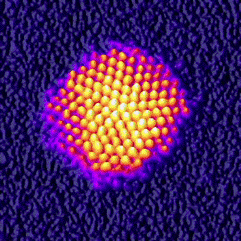报告题目:Size-selected gold clusters: resolving the atomic structure of model catalysts
报 告 人:Prof. Richard E Palmer(Nanoscale Physics Research Laboratory, School of Physics and Astronomy, University of Birmingham, Birmingham, B15 2TT, U.K.)
报告时间:2015年9月23日(星期三),上午11:00
报告地点:bat365在线中国官网登录入口六层学术报告厅(致知楼3623-3624)
报告摘要:
The controlled deposition of beams of size-selected nanoclusters (nanoparticles), assembled from atoms in the gas phase and mass-selected before deposition, is a novel [1] but increasingly popular route to the fabrication of functional surfaces structured on the sub-10nm scale, with applications in catalysis, coatings, radio-sensitizers and biochips [2]. These systems also have the potential to serve as model, ultraprecise reference materials for bio-imaging and metrology (e.g. cryo-electron tomography) and nanotoxicology. Efforts to scale-up the rate of cluster generation thus promise significant future impact and will be summarised. However fundamental questions remain over the equilibrium atomic structures of the clusters themselves, since direct gas phase structural studies have been limited and new techniques like aberration-corrected scanning transmission electron microscopy (ac-STEM) are only now being applied to soft-landed, size-selected clusters.
I will survey our recently published [2-8] and latest systematic ac-STEM experiments which address  the atomic structure of size-selected “magic number” gold clusters – Au20, Au55, Au309, Au561, and Au923 – including dynamical manipulation experiments [6], which probe the transformation of metastable isomers into more stable configurations, and reaction-exposure experiments, which probe the stability of the nanocluster structures under real catalytic conditions. The results distinguish the hierarchy of competing isomers as a function of cluster size, expose concepts such as templated-growth, provide a body of data to stimulate and constrain computational models and are readily extendable to other sizes and cluster materials including binary systems. The image shows one frame from a dynamical STEM video of an Au923±23 cluster.
the atomic structure of size-selected “magic number” gold clusters – Au20, Au55, Au309, Au561, and Au923 – including dynamical manipulation experiments [6], which probe the transformation of metastable isomers into more stable configurations, and reaction-exposure experiments, which probe the stability of the nanocluster structures under real catalytic conditions. The results distinguish the hierarchy of competing isomers as a function of cluster size, expose concepts such as templated-growth, provide a body of data to stimulate and constrain computational models and are readily extendable to other sizes and cluster materials including binary systems. The image shows one frame from a dynamical STEM video of an Au923±23 cluster.
1. R.E. Palmer, S. Pratontep and H.-G. Boyen, Nature Materials 2 443 (2003).
2. R.E. Palmer and C. Leung, Trends in Biotechnology 25 48 (2007).
3. Z.W. Wang and R.E. Palmer, Nano Lett. 12 91 (2012).
4. Z.W. Wang and R.E. Palmer, Nanoscale 4 4947 (2012) [Cover].
5. Z.W. Wang and R.E. Palmer, Nano Lett. 12 5510 (2012).
6. Z.W. Wang and R.E. Palmer, Phys. Rev. Lett. 108 245502 (2012).
7. S.R. Plant, L. Cao, F. Yin, Z.W. Wang and R.E. Palmer, Nanoscale 6 1258 (2014) [Cover]; S.R. Plant, L. Cao and R.E. Palmer, JACS 136 7559 (2014).
8. D.M. Wells, G. Rossi, R. Ferrando and R.E. Palmer, Nanoscale, 2015, Advance Article [Cover];DOI: 10.1039/C4NR05811A.
报告人简介:

Richard E Palmer is Professor of Experimental Physics at the University of Birmingham and Head of the Nanoscale Physics Research Laboratory, which he established in 1994, the first centre for nanoscience in the UK. His research interests include atomic clusters, atomic manipulation and nanofabrication, with applications in catalysis, coatings and cancer research. He obtained his first degree (1983) and PhD (1986) at Cambridge University, where he held 1851, Clare College and Royal Society Research Fellowships. He has held visiting positions at Cornell, Oxford and Harvard Universities. In 1996 he was awarded the CV Boys Medal of the Institute of Physics and in 2010 he received an Honorary Doctoral Degree (dr. h.c.) from Hasselt University, Belgium. In 2012 he was elected Fellow of the Royal Society of Chemistry, and awarded a senior EPSRC Fellowship. In 2013 he was awarded the Senior Prize and John Yarwood Memorial Medal of the British Vacuum Council. He has published over 300 papers and 20 patent applications and his research has also led to the formation of a series of spin-out companies.
r.e.palmer@bham.ac.uk
www.nprl.bham.ac.uk
欢迎广大师生参加!
bat365在线中国官网登录入口
2015年9月12日
